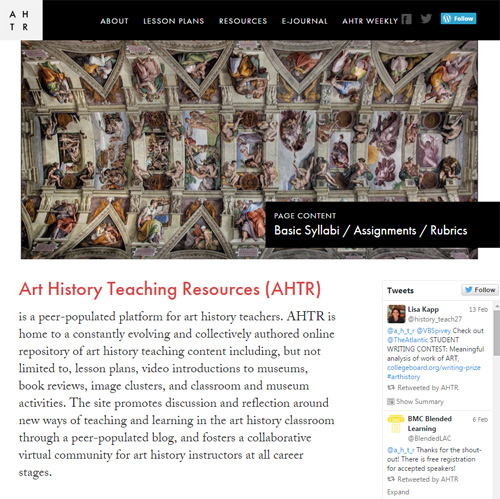Guest blogger: Macie Hall, from the CER‘s Innovative Instructor.
 The first week in February, I attended the annual College Art Association conference in Washington, DC and co-chaired a panel titled Rethinking Online Pedagogies for Art History. In an era where higher education teaching and learning are being re-examined, and our institutions are pushing faculty to adopt innovative instructional practices, instructors may find themselves at a loss. It’s great to hear about online teaching, flipped classrooms, exciting apps that will engage students, but how exactly does one go about implementing these new strategies? Our approach for the panel was to showcase ideas and tools for teaching art history by having the speakers introduce innovative approaches, with a focus on key takeaways that could be adapted to an individual’s teaching practices. The topics included using peer assessment, student authorship of course content, gaming, e-portfolios, using Omeka,Neatline, and Voicethread, building an app and a website for an onsite course, and a presentation from Art History Teaching Resources, AHTR.
The first week in February, I attended the annual College Art Association conference in Washington, DC and co-chaired a panel titled Rethinking Online Pedagogies for Art History. In an era where higher education teaching and learning are being re-examined, and our institutions are pushing faculty to adopt innovative instructional practices, instructors may find themselves at a loss. It’s great to hear about online teaching, flipped classrooms, exciting apps that will engage students, but how exactly does one go about implementing these new strategies? Our approach for the panel was to showcase ideas and tools for teaching art history by having the speakers introduce innovative approaches, with a focus on key takeaways that could be adapted to an individual’s teaching practices. The topics included using peer assessment, student authorship of course content, gaming, e-portfolios, using Omeka,Neatline, and Voicethread, building an app and a website for an onsite course, and a presentation from Art History Teaching Resources, AHTR.
The great thing about AHTR is that it is a resource that has value for art historians, instructors in other humanities disciplines and beyond. Some of the content is general, for example, the Library of Pedagogy has descriptions of texts that will be applicable to those teaching in any humanities discipline, as well as general books on teaching practices. A section on Syllabi/Assignments/Rubrics includes models, templates, and advice that can be easily adapted to other subjects.
Scan the blog posts in the ATRH Weekly. Posts on Slow Teaching, Field Notes from an Experiment in Student-Centered Pedagogy, and Pedagogy through Observation caught my eye as being broad-based in their application. And finally, if you are interested in the Scholarship of Teaching and Learning (SoTL) or want to know more about it, check out What is SoTL?, an article that will be informative whether you are in the humanities, social sciences, or STEM disciplines.
